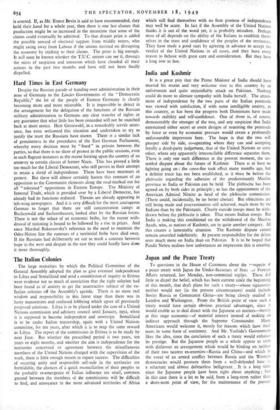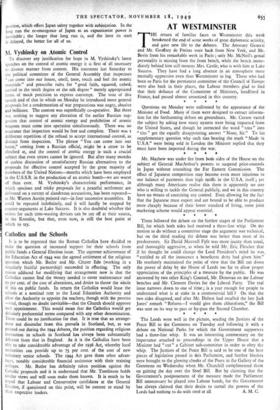Japan and the Peace Treaty
To questions in the House of Commons about the "-ospects of a peace treaty with Japan the Under-Secretao of State Foreign Affairs returned, last Monday, non-committal replies. These did little to dispel the belief, which has been current sin& the beginning of this month, that draft plans for such a treaty—whose signatories neither would nor (in the present circumstances) could include Soviet Russia or Communist China—are being closely studied in London and Washington. From the British point of view such a treaty would have certain obvious practical advantages, since it would enable us to deal direct with the Japanese on matters—mostly at this stage economic—of material interest instead of making an indirect approach through the Supreme Commander. Many Americans would welcome it, mostly for reasons which have their roots in some form of sentiment. And Mr. Yoshida's Government likes the idea, since the conclusion of such a treaty would enhance its prestige. But the Japanese people as a whole appear to view with disfavour an arrangement which would be binding on neither of their two nearest ex-enemies—Russia and China—and which in the event of an armed conflict between Russia and the Western democracies would promote them from a well-defended base :0 a reluctant and almost defenceless belligerent. _ It is a long time since the Japanese people have been right about anything ; but in this case there is a lot to be said, from a long-term rather than a short-term point of view, for the maintenance of the present
position, which offers Japan safety together with subjugation. In the tong run the re-emergence of Japan as an expansionist power is inevitable ; the longer that long run is, and the later its start is delayed, the better for all of us.















































































 Previous page
Previous page